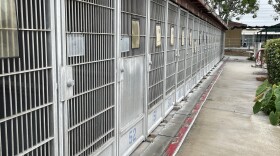San Diego is the only city in California that doesn't use secondary treatment before sending its sewage into the ocean. Federal law requires the treatment. Historic dry conditions in the region may play a role in whether the city applies for another exemption to federal law. KPBS Reporter Ed Joyce explains.
San Diego has been given two exemptions from the federal Clean Water Act for the Point Loma Sewage Treatment Plant . The waiver allows the city to process sewage at the advanced primary level before sending it several miles offshore into the ocean. Environmental groups say the city needs to retrofit the plant to meet federal standards and to prevent sewage spills. But despite threats of legal action if the city applies for another waiver, City Attorney Mike Aguirre is suggesting just that. He says money for upgrading the plant would be better spent on a water recycling program.
Aguirre: If we go to secondary treatment we're going to spend over a billion dollars in order to improve the quality of the water we're discharging and none of it will be reusable. That's why recycled water makes the most sense.
Bruce Reznik with San Diego Coastkeeper says the group may take legal action if the city applies for another waiver. But Reznick says he would support another waiver if the city started a reclaimed water program.
Reznik: It is going to be expensive to upgrade Point Loma although not as expensive as the city claims. We'll give you another waiver if you take seriously, take serious steps to implement water reuse projects. And this is where Mike Aquirre's plan comes in.
He says the group would also support another waiver if the city has an enforceable timeline for upgrading the treatment plant. Mayor Jerry Sanders says he's against the so-called "toliet-to-tap" recycling plan. The city plans to decide by the end of the year whether to apply for another EPA waiver. Coastkeeper's Reznik says he's waiting to hear from Sanders before the group takes any action. Ed Joyce, KPBS News.





